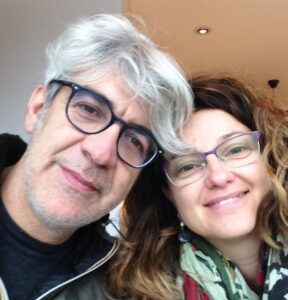Emotional Intelligence for competitive advantage
Leaders able to generate a safe and creative working environment
This article looks into emotional intelligence as a key skill required to increase the competitive advantage of organisations that are aware of global divides (economical, environmental and social) and are willing to operate a win-win approach. This is done with the Agenda 2030 objectives in mind.
The article draws attention to the importance of emotional intelligence in generating a safe and creative working environment, and this is an essential ingredient for a competitive advantage built on the imperfect and inimitable uniqueness of a soulful and purposeful organisation. The article also highlights the importance of emotional intelligence in dealing with the complexity and uncertainty of today’s world and with the resistance to change.
In today’s world, where events unfold in completely unexpected ways, changes are becoming increasingly unpredictable, and determining causes and effects are becoming more and more complex, leaders can no longer rely on strategies that worked in the past. Past experiences are losing their relevance and are rarely applicable when predicting the turn of future events. Problems and their repercussions are more multi-layered than ever before, and these different layers intermingle, making it even more challenging to get an overview of how things are related. The demands for modern organisations and leadership are more contradictory and paradoxical than ever, and they challenge value systems to the core. This is quite often why organisations and their stakeholders resist change – as a reaction to the way in which changes are led. The need to continue operating from old paradigms, even if these have been shown to be disruptive, is essentially an emotional reaction closely related to the fear of the unknown and the human need for stability. In order to enable sustainable changes, contemporary leaders need to be aware of ongoing changes and to relate to their organisation’s stakeholders at an emotional level, using the interpersonal dimension of their leadership position to create a favourable work environment. The Latin etymology of the word ‘emotion’ is e-movere, which suggests that emotions are inner movements that help us to take action, to survive, to avoid danger, to make decisions and to relate to others. Laloux states that there is wisdom to be found in emotions “if we learn to inquire into their significance: Why am I angry, fearful, ambitious, or excited? What does this reveal about me or about the situation that is unfolding?” Emotional intelligence is the one competence that can replace fear with trust, since a heightened consciousness no longer feels the urge to control one’s own emotions or the emotions of others. A sense of trust arises out of one’s inner wisdom, interactions with others, and an “abundance of life” . “We come to believe that even if something unexpected happens or if we make mistakes, things will turn out all right, and when they don’t, life will have given us an opportunity to learn and grow […] instead of setting goals for our life, dictating what direction it should take, we learn to let go and listen to the life that wants to be lived through us” .
Emotional intelligence facilitates a work-life balance that supports and minimises the effects of a chaotic environment, as well as capitalising on today’s frequent and disruptive accelerating changes to bring about growth and development. Being emotionally intelligent in one’s leadership approach means knowing how to stop and process an “action inquiry” or reflection, and using this to “connect the inner experience to the outer world observations and at the same time to be able to communicate about the inner world with the outer world.” This means that emotional intelligence can help individuals to shift from seeing “information that is incongruous with their worldview or with the future their ego has projected and is attached to” , to accepting the sometimes unpleasant truths about reality. This, in turn, makes them less attached to outcomes. When they are at peace with themselves, leaders’ “rational thinking can be more accurately informed by data” . The ability to read, understand and apply big data within their environment is what identifies successful leaders and organisations. “At its core, leadership is about shaping and shifting how individuals and groups attend to and subsequently respond to a situation” . Responding to a situation means switching off autopilot, exploring new possibilities with inner calmness and addressing conflicts with dialogue and understanding. Responding means first observing with care and awareness rather than jumping to conclusions. It means seeing the situation from every angle and accepting that one’s opinion may not be the only one or even the best one. Responding also requires a certain dose of intuition and creativity, as a mind that’s trapped in old world views is not able to move to a more complex stage of consciousness. “According to the research, the trigger for vertical growth always comes in the form of a major life challenge that cannot be resolved from the current worldview” . To quote Albert Einstein, “a new type of thinking is essential if mankind is to survive and move toward higher levels.” This means that facing problems and failures with a creative approach is essential for moving on to a more developed state. The challenges of today require an “open mind, heart and will” in order to allow space for a generative, and therefore creative, approach which is one of the most important elements for leaders and organisations when maintaining a sustainable and competitive advantage. When talking about an open mind, heart and will, we are referring to Scharmer’s four levels of listening. In his book Theory U, Scharmer states that being aware of one’s own kind of listening lies at the heart of successful leadership, as it allows individuals and groups within organisations to identify the habits of attention in their business culture. An openness of mind, heart and will refers to the three brains that each of us is equipped with. An awareness of these three forms of intelligence will allow us to listen from a deeper place, in which judgment, cynicism and fear are suspended in order to create a space where something new can be generated that goes beyond the systems of the past and allows the future to emerge. “In the absence of judgment, relationships take on a new quality. Our listening is no longer limited to gathering information so as to better convince, fix, or dismiss. We can create a shared space safe from judgment, where our deep listening helps others to find their voice and their truth, just as they help us find ours.” If we assume that a sustainable competitive advantage arises from the capability of being imperfectly mobile and imperfectly inimitable (Peteraf, 1993), i.e the capacity of organisations to innovate, then we can consciously take into account the available resources and the interconnectedness of all stakeholders involved in business processes as a key factor for reaching an eco-systemic driven success. Being imperfectly mobile means that it’s difficult for the competing organisations to determine the processes that lead to your success, thereby making it harder for them to imitate your organisation’s capabilities because they are a complex fusion of various resources that are organisation-specific. In order to create this environment and foster creativity, it’s important that the work environment becomes an emotionally safe place. This doesn’t mean that people shouldn’t take responsibility for their actions. Rather, it means that people should work in a safe context, in which they are allowed to look at failure as an alternative way to learn and grow. With this in mind, it’s quite clear that emotional intelligence plays a fundamental role in creating the kind of safe environment that supports a sustainable competitive advantage. In this context leaders are called to exploit the opportunities that changes provide by envisioning the future and working with others to initiate changes that will create a viable future for the organisation. When implementing strategic change, success depends primarily on how stakeholders view the change and the process that leads to it, as “most resistance to change is an emotional reaction” . This means that the leader’s emotional engagement with the stakeholders becomes essential, as does the attempt of the organisation to create a culture that facilitates the leadership of all stakeholders and not only the ones designated as leaders. “What can be done is to create environments that are conducive to growing into later stages. When someone is surrounded by peers who already see the world from a more complex perspective, in a context safe enough to explore inner conflicts, chances are higher that the person will make the leap” . The environments we are referring to are those organisations where emotionally intelligent individuals have the capacity “to shift from external to internal yardsticks in their decision-making” . We’re talking about that collective intelligence, which addresses questions such as: “Does this decision seem right? Am I being true to myself? Is this in line with who I sense I’m called to become? Am I being of service to the world? With fewer ego-fears, we are able to make decisions that might seem risky, where we haven’t weighed all possible outcomes, but that resonate with deep inner convictions. We develop sensitivity for situations that don’t quite feel right, situations that demand that we speak up and take action, even in the face of opposition or with seemingly low odds of success, out of a sense of integrity and authenticity. Recognition, success, wealth, and belonging are viewed as pleasurable experiences, but also as tempting traps for the ego” .
Laloux’s words suggest that the competitive advantage is to be seen in “soulful and purposeful” organisations that “strive for wholeness and community, and are places that support people’s longing to be fully themselves at work, and yet be deeply involved in nourishing relationships.” Unfortunately, when having to face new challenges, stress levels and adrenaline increase in the working environment and most of the time the workplace becomes a “playing field for unfulfilling pursuits of our egos, inhospitable to the deeper yearnings of our souls” . To avoid organisations becoming meaningless places where “politics, bureaucracy, infighting, stress, burnout, resignation, resentment and apathy” take over, it is very important to nurture the emotional intelligence of people, to develop an attitude that replaces instinctive reactions with “intuitive and conscious” responses. The “intuitive mind is a sacred gift and the rational mind is a faithful servant and we’ve created a society that honours the servant and has forgotten the gift”. Human intuition has to do with the signals that the three brains (encephalic, cardiac and enteric) send to each other when we’re attending to our inner world and to the phenomenological events. The wisdom of emotional intelligence also resides in intuition. “Intuition honours the complex, ambiguous, paradoxical, non-linear nature of reality; we unconsciously connect patterns in a way that our rational mind cannot. Intuition is a muscle that can be trained, just like logical thinking: when we learn to pay attention to our intuitions, to honour them, to question them for the truth and guidance they might contain, more intuitive answers will surface” . Cognition at this stage is more than just facts. It taps into a broader range of sources to support decision making, which is at the centre of a successful position in the market. This shift can happen when the encephalic, cardiac and enteric brain are in alignment . In other words, when leaders and members of organisations become emotionally intelligent, they are also capable of being attentive and receptive to what is happening in the present moment, without being overly influenced by past experiences. This requires the ability to be in contact with oneself and to detect and regulate one own’s emotions, in order for these emotions to provide the most adequate response to the challenges faced in any given moment. In today’s emotionally saturated and conflict-prone environment, being emotionally intelligent means understanding how our emotions and actions affect the people and the environment around us. Emotionally intelligent leaders can contribute to the competitive advantage of their organisations by replacing old “predict and control” strategies – facing new situations by looking at and analysing past experiences – with new “sense and respond” paradigms – facing new situations with intuition. This enables reenergised organisations to provide “a new [organizational] model that makes work productive, fulfilling and meaningful.”
The competitive advantage in our era will then consist of “yearning for wholeness. bringing together the ego and the deeper parts of the self; integrating mind, body, and soul; cultivating both the feminine and masculine parts within; being whole in relation to others; and repairing our broken relationship with life and nature.”
Bibliography
- Laloux F. (2014) Reinventing organisations. A Guide to Creating Organisations. Nelson Parker. Brussels
- Peteraf MA. 1993. The cornerstones of competitive advantage: resource-based view. Strategic Management Journal.
- Samples B. (1976) Metaphoric Mind: A Celebration of Creative Consciousness. The author quotes and interprets Einstein
- Scharmer Otto, Kaufer Katrin (2013) Leading from the Emerging Future. From Ego-System to Eco-System Economies. Berrett-Koehler Publishers. San Francisco.
- Scharmer Otto. (2009) Theory U – Leading from the Future as It Emerges. The Social Technology of Presencing, Berrett-Koehler Publishers. San Francisco.
- Voola R., Carlson J, West AS 2004. Emotional intelligence and competitive advantage: examining the relationship from a resource-based view. Article in Strategic Change
- https://arawanahayashi.com/read
- https://www.presencing.org
Mario D’Agostino
 I am an expert in nonformal education and experiential learning. Since 1989 I have worked as a trainer, consultant and facilitator for several institutions, both for profit and non profit organisations. From 1998 to 2003 I was vice president of the “Advisory Council”, the political body of the “Youth and Sport Directorate of the Council of Europe”. During those years I developed an expertise in facilitating participation process, community work, intercultural communication and learning, training for trainers in experiential learning, personal and group development. Since 2004 I have worked as the legal representative of Kamaleonte and one of the founder members of the international academy of experiential education “Via Experientia”, where I also facilitate long-term training programmes for trainers and leaders on “How to facilitate groups and lead teams”. My main strength as a facilitator and coach is the ability to process individual growth and group dynamics through experience and reflective practices. My learning journey and personal development and my curiosity for developing new concepts in the field of learning and leadership will never come to an end.
I am an expert in nonformal education and experiential learning. Since 1989 I have worked as a trainer, consultant and facilitator for several institutions, both for profit and non profit organisations. From 1998 to 2003 I was vice president of the “Advisory Council”, the political body of the “Youth and Sport Directorate of the Council of Europe”. During those years I developed an expertise in facilitating participation process, community work, intercultural communication and learning, training for trainers in experiential learning, personal and group development. Since 2004 I have worked as the legal representative of Kamaleonte and one of the founder members of the international academy of experiential education “Via Experientia”, where I also facilitate long-term training programmes for trainers and leaders on “How to facilitate groups and lead teams”. My main strength as a facilitator and coach is the ability to process individual growth and group dynamics through experience and reflective practices. My learning journey and personal development and my curiosity for developing new concepts in the field of learning and leadership will never come to an end.
Angelica Paci
For over 10 years I have been training and facilitating groups and individuals in their personal and professional growth and well-being through experiential learning programmes, where reflective practices have been a core element in learning and development. In recent years I have been working for Kamaleonte in the field of leadership, multiple intelligences and emotional intelligence. I am also a founding member of the international nonformal network of “Via Experientia” and of ALP. I believe that the group is a resource for learning and that diversity is a value that enriches people and the context in which they live, learn and work. This is why Otto Scharmer’s “Theory U” and Arawana Hayashi’s social presencing theatre are inspiring me and currently integrated in my work.


